Seven years into the Tarpon Genetic Recapture Study, biologists with the Florida Fish and Wildlife Conservation Commission (FWC) and Mote Marine Laboratory are gaining new insights into tarpon movement and seasonal habitat preferences. With the help of anglers participating in the study, researchers have confirmed that some tarpon move long distances, and others stay close to home. Biologists have also found evidence of a connection between tarpon habitats in southwest Florida and those of the Florida Keys.
Anglers sampled two tarpon in Charlotte Harbor during August 2010. Both fish were caught the following spring in the Florida Keys – more than 150 miles away. These tarpon were initially sampled inshore at the end of a spawning season, in close proximity to offshore areas in the Gulf where spawning is presumed to occur.
Sampling of another tarpon showed the fish can travel a similar distance in a shorter time. That tarpon was caught near Islamorada in July 2011, about one month after an angler reeled it in during peak spawning season near Sarasota.
Researchers can track these tarpon thanks to volunteer anglers who submit tarpon DNA samples to the FWC. When an angler catches and samples a tarpon that was previously sampled, a recapture occurs. Through recaptures, biologists can compare catch times and locations to determine movement.
In the study, the farthest distance recorded between an initial catch and a recapture is approximately 280 miles. That tarpon was reeled in near Apalachicola in July 2007 before it was recaptured near Captiva in May 2009.
Anglers have submitted over 13,000 tarpon DNA samples to the FWC, including more than 4,000 in 2011. Among the samples, researchers have documented about 100 recaptured tarpon.
Anglers who would like to assist the study can obtain a free, easy-to-use tarpon DNA sampling kit by emailing TarponGenetics@MyFWC.com or by calling 800-367-4461.
A new video provides a step-by-step look at how an angler takes a tarpon DNA sample for the study. The video, produced by Florida Sea Grant and the University of Florida Institute of Food and Agricultural Sciences Communications, can be viewed at www.YouTube.com/user/MyFWCsocial.
For more information on the Tarpon Genetic Recapture Study, visit www.MyFWC.com/Research, click on “Saltwater,” and select “Tarpon Genetics” under “Tarpon.”









